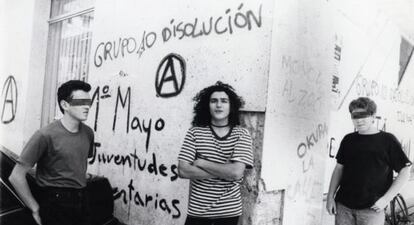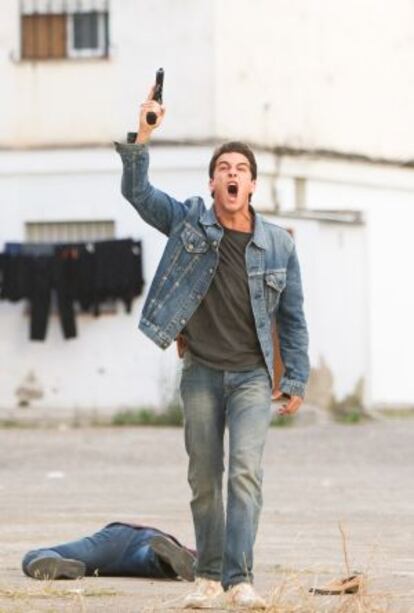“We were an anti-drug machine”
Devoted to battling the narcotics trade at the end of the 1980s, Units 6 and 10 of the Seville police were the real-life inspiration for tough crime drama ‘Unit 7’

The end credits of the hard-hitting crime drama Unit 7 offer the usual disclaimer saying that all events portrayed in the movie are fictitious and any resemblance to reality is purely coincidental. But while the police unit depicted in the film may not have been real, back in the late 1980s Units 6 and 10 of the Seville Brigade for Citizen Safety were charged with the same task of cleaning the streets of junkies, dealers and other criminals connected to the drug trade ahead of Expo 92, which was set to turn the world spotlight onto the Andalusian capital.
José Robles was in charge of Unit 10. Now 51, he retired from the National Police five years ago. “We were an anti-drug machine,” he recalls. Unit 6 was led by Franciso Climent Valladares, now 58 and also a retired cop: “We pulled the short straw: combating small-scale drug trafficking on the streets. The final mission was to clean up Seville with the aim of having a good Expo 92.”
Having just returned from New York, where Unit 7 received a special jury mention for its cinematography at the Tribeca Film Festival, director Alberto Rodríguez admits he was aware of the story of both police units while preparing the film. “We interviewed other police officers and journalists from the time, but this film does not deal with a specific reality. We don’t claim to tell the story of Units 6 and 10. It is fiction. What is reflected is the atmosphere in the street at that time. Areas of the city such as El Pumarejo and La Alameda were Comanche territory back then.”
In real life, Units 6 and 10 worked hard all over the city. Heroin had been circulating freely in Spain for years, “and the whole of Seville was a drugs hotspot back then,” say members of both units. Each of them was made up of two dozen agents. “The most troubled areas were the neighborhoods of Torreblanca, Las 3,000 Viviendas, some parts of the Polígono de San Pablo and La Alameda, depending on which corners.”
The film is fiction, but it does reflect the atmosphere on the streets back then”
Their fight brought successes, but betrayals of informants led to legal action after members were accused of forming a police mafia that didn’t hesitate in using robbery or torture and dealing in drugs themselves. Some agents were imprisoned during the preliminary investigation, but all were eventually acquitted.
When he accepted the role in Unit 10, Robles made battling the drug trade a personal matter. He says he has no regrets, maintaining that they didn’t normally overstep the mark in terms of using violence.

“Even when you identified yourself as police during an operation, violent situations could still occur and you had to work hard to overpower suspects trying to escape.” He says he never bought informants with drugs. “I was completely against that. Occasionally we did them a favor by releasing them, depending on the operation. Or I paid the odd informant a small amount.”
Passing himself off as a buyer, Unit 10 member Domingo Delgado Pino, then known as “Baby Face,” normally went inside drug dens with a .38 revolver hidden in his trousers. Now Popular Party mayor for the Seville town of Burguillos, he says he was injured 76 times during active service.
“When you went into an apartment to buy drugs and they found you out, either you hit them or they hit you. In 1991 I was shot in the face [...], which years later led to me losing my hearing in one ear.
“I am proud of everything we did,” he says. “I had the best years of my life in Unit 10.”
Tu suscripción se está usando en otro dispositivo
¿Quieres añadir otro usuario a tu suscripción?
Si continúas leyendo en este dispositivo, no se podrá leer en el otro.
FlechaTu suscripción se está usando en otro dispositivo y solo puedes acceder a EL PAÍS desde un dispositivo a la vez.
Si quieres compartir tu cuenta, cambia tu suscripción a la modalidad Premium, así podrás añadir otro usuario. Cada uno accederá con su propia cuenta de email, lo que os permitirá personalizar vuestra experiencia en EL PAÍS.
¿Tienes una suscripción de empresa? Accede aquí para contratar más cuentas.
En el caso de no saber quién está usando tu cuenta, te recomendamos cambiar tu contraseña aquí.
Si decides continuar compartiendo tu cuenta, este mensaje se mostrará en tu dispositivo y en el de la otra persona que está usando tu cuenta de forma indefinida, afectando a tu experiencia de lectura. Puedes consultar aquí los términos y condiciones de la suscripción digital.









































